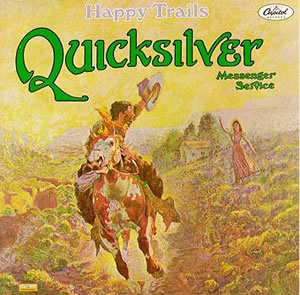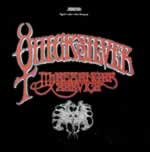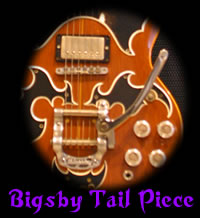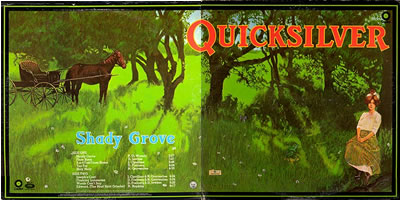John Cipollina - Electric Guitarslinger
 John
Cipollina, Greg Elmore, David Freiberg, Gary Duncan, and Jim Murray
were the founding members of the San Francisco psychedelic rock
band known as Quicksilver
Messenger Service. During the 1960's, Quicksilver
Messenger Service was one of the most popular and well respected
bands playing in the acid rock scene. The band
played alongside the other top legendary San Francisco bands
such as Janis
Joplin with Big
Brother and the Holding Company, Jefferson
Airplane, the
Grateful Dead, and many other great acts. During
his years of playing with Quicksilver Messenger Service, John Cipollina
developed his trademark guitar style and sound. John's
sound was defined by the technique of his guitar playing and the
equipment he used to play the music. John Cipollina's
guitar playing and his advanced ideas in equipment and special effects,
helped make Quicksilver Messenger Service a great influence on many
musicians.
John
Cipollina, Greg Elmore, David Freiberg, Gary Duncan, and Jim Murray
were the founding members of the San Francisco psychedelic rock
band known as Quicksilver
Messenger Service. During the 1960's, Quicksilver
Messenger Service was one of the most popular and well respected
bands playing in the acid rock scene. The band
played alongside the other top legendary San Francisco bands
such as Janis
Joplin with Big
Brother and the Holding Company, Jefferson
Airplane, the
Grateful Dead, and many other great acts. During
his years of playing with Quicksilver Messenger Service, John Cipollina
developed his trademark guitar style and sound. John's
sound was defined by the technique of his guitar playing and the
equipment he used to play the music. John Cipollina's
guitar playing and his advanced ideas in equipment and special effects,
helped make Quicksilver Messenger Service a great influence on many
musicians.
 John
Cipollina developed his own unique style of guitar playing that
relied on the use of finger picking, while pulling on the vibrato
bar of the electric guitar, and his own custom amplifier
stack and controls. Wearing two plastic finger picks that
were custom filed to shape, he picked and/or plucked the strings
with his thumb and index finger. His finger picking style
was initially developed in classical guitar training that he was
provided in his youth, as well as his study of the style of finger
picking employed by Chet
Akins. As John became interested in studying blues guitar
players, he brought together finger picking techniques from all
the genres he had played to create his own unique style. John's
finger picking style was married to his use of the vibrato
bar, and then broadcast via his custom sound system.
John
Cipollina developed his own unique style of guitar playing that
relied on the use of finger picking, while pulling on the vibrato
bar of the electric guitar, and his own custom amplifier
stack and controls. Wearing two plastic finger picks that
were custom filed to shape, he picked and/or plucked the strings
with his thumb and index finger. His finger picking style
was initially developed in classical guitar training that he was
provided in his youth, as well as his study of the style of finger
picking employed by Chet
Akins. As John became interested in studying blues guitar
players, he brought together finger picking techniques from all
the genres he had played to create his own unique style. John's
finger picking style was married to his use of the vibrato
bar, and then broadcast via his custom sound system.
 John
was partial to a particular brand of vibrato bar known as the Bigsby
Tailpiece. The vibrato bar is a metal handle attached to the tailpiece
of the guitar, when the handle is pulled or pushed the strings stretch.
The stretching of the strings creates a warbling vibrating sound,
or perhaps better described as a sense of reverb. Furthermore the
use of the vibrato bar often pushed the guitar out of tune. Once
his guitar was technically out of tune, John could pull his notes
back in tune by constantly stretching the strings with the Bigsby
and listening for stop points with his ear. This style of guitar
playing required constant attention and attack to maintain the level
of intensity needed to create the Cipollina sound. John Cipollina
created several custom guitars that were designed to exploit the
properties of the Bigsby Tail piece.
John
was partial to a particular brand of vibrato bar known as the Bigsby
Tailpiece. The vibrato bar is a metal handle attached to the tailpiece
of the guitar, when the handle is pulled or pushed the strings stretch.
The stretching of the strings creates a warbling vibrating sound,
or perhaps better described as a sense of reverb. Furthermore the
use of the vibrato bar often pushed the guitar out of tune. Once
his guitar was technically out of tune, John could pull his notes
back in tune by constantly stretching the strings with the Bigsby
and listening for stop points with his ear. This style of guitar
playing required constant attention and attack to maintain the level
of intensity needed to create the Cipollina sound. John Cipollina
created several custom guitars that were designed to exploit the
properties of the Bigsby Tail piece.
Quicksilver Messenger Service was a San Francisco dance hall band that made it's mark through live performances. Their concerts included performing in the San Francisco area at the Winterland, the Fillmore, the Avalon Ballroom, the Matrix, and the famous Monterey Pop Festival in 1967. Bill Graham, a famous music promoter, was a big fan of John's guitar playing and helped to promote the music of Quicksilver Messenger Service at venues across the country.
 Although
Quicksilver Messenger Service released many albums, John was mainly
involved with the first three releases. These three albums
are some of the great masterpieces of the San Francisco acid rock
era. The first two albums relied heavily on the dual
guitar work of John Cipollina and Gary Duncan, the bass playing
of David Freiberg, and drumming of Greg Elmore. (Jim Murray
quit the band before they started recording.) The self titled
debut album was a studio version of the Quicksilver Messenger Service
sound, followed by the "Happy Trails" live album.
The third album was made without Gary Duncan, and featured Nicky
Hopkins on Keyboards. While on break from recording and touring
with the Rolling
Stones, Nicky joined Greg Elmore, David Freiberg, and John to
record a musical masterpiece titled "Shady Grove".
Although
Quicksilver Messenger Service released many albums, John was mainly
involved with the first three releases. These three albums
are some of the great masterpieces of the San Francisco acid rock
era. The first two albums relied heavily on the dual
guitar work of John Cipollina and Gary Duncan, the bass playing
of David Freiberg, and drumming of Greg Elmore. (Jim Murray
quit the band before they started recording.) The self titled
debut album was a studio version of the Quicksilver Messenger Service
sound, followed by the "Happy Trails" live album.
The third album was made without Gary Duncan, and featured Nicky
Hopkins on Keyboards. While on break from recording and touring
with the Rolling
Stones, Nicky joined Greg Elmore, David Freiberg, and John to
record a musical masterpiece titled "Shady Grove".
After Shady Grove, John began to develop his own band known as "Copperhead" and spent less time working on projects with Quicksilver Messenger Service. He continued to work with Greg Elmore, David Freiberg, Gary Duncan, Dino Valenti, and others on Quicksilver Messenger Service projects during the 1970s.
